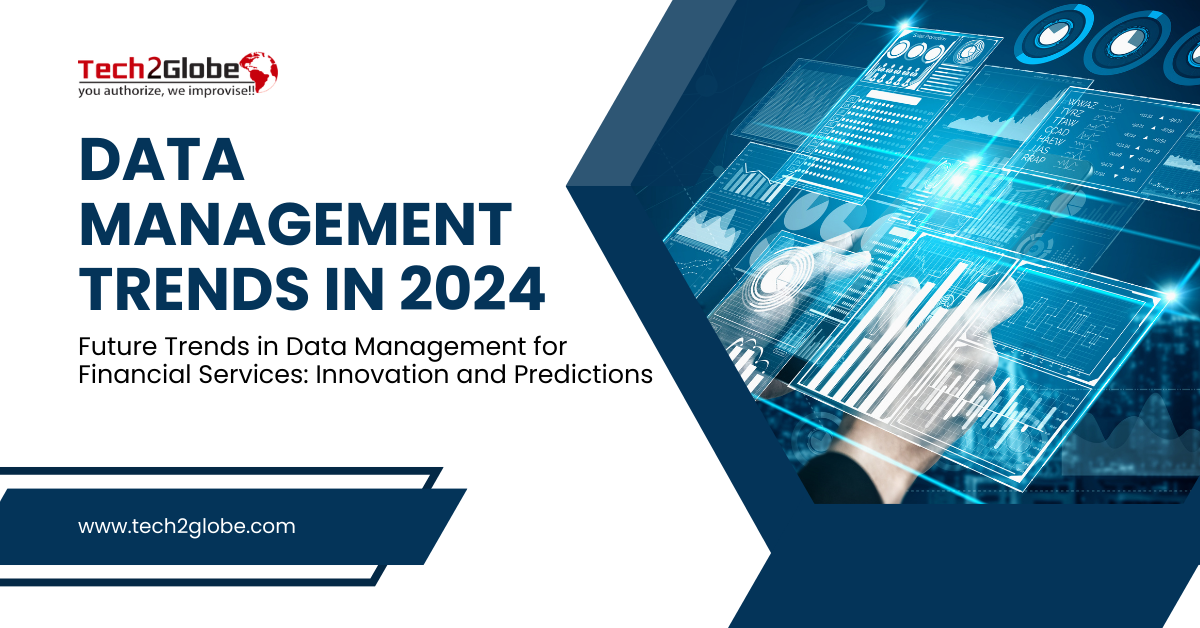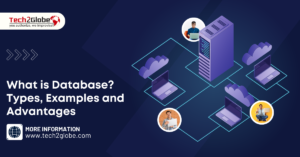Consumer data privacy concerns will grow rapidly as more users become aware of how businesses use their data. With so much sensitive customer information available, financial institutions can no longer wait for a breach or attack before implementing effective strategies.
Tech2Globe is a leading expert in providing data management financial services to manage data more efficiently. Our experts deliver customized solutions that meet the specific needs of banks and financial institutions. This ensures that the data is reliable, follows all regulations, and is easily accessible when needed.
Financial Data Management
Assume your financial data as a gigantic puzzle. Each component (bank account, invoice, investment) is crucial but needs to be dispersed and clarified.
Financial data management is similar to fitting a puzzle together. It’s a solution for storing, organizing, and analyzing your financial data in one spot. Imagine it as a high-tech filing cabinet with fancy tools:
- Data collectors: Obtain information from your accounts, websites, and systems.
- Organizers: Clean and categorize the data into “income,” “expenses,” and “investments.”
- Analyzers: Reveal trends, patterns, and insights buried in data.
- Reporters: Create concise reports and dashboards to understand your financial situation better.
What are the challenges of data management in financial services?
Financial firms that must manage vast amounts of susceptible consumer data, such as credit card information, bank account information, PINs, and so on, may face data management issues. It is an integral part of cybersecurity that should not be disregarded. Let’s look at some of the major problems in financial industry data management:
Rising complexity
Many factors contribute to the growing digital attack surface, including using third- and fourth-party vendors, a move to remote work environments, extensive cloud adoption, and the proliferation of end-user mobile banking solutions. Given these factors, acquiring complete visibility into all areas of your organization’s cybersecurity posture might be challenging.
Multiple data silos
Some financial systems still use a combination of paper-based, electronic, and phone-based solutions, and integrating different information sources can be difficult and potentially lead to fraud risks. Organizations from all industries struggle to break down organizational silos, which can result in segmented data access and the installation of several-point solutions that only address a single area of cybersecurity and data management.
Big Data and data quality
Financial services data arises from many sources, and organizations must ensure they’re leveraging the most reliable, high-quality data possible. Also, several organizations have started to use Big Data as an investment opportunity.
Data Management Trends in Financial Services
- Transparency: Customers are becoming more conscious of how companies acquire, store, and distribute their personal information. Focusing on all this, transparency is now the most popular trend in financial service providers as they try to build trust and confidence in their consumers. Maintaining transparency in data management allows your business to capitalize on acquiring the trust of its consumers. Almost all financial services organizations focus on precautions taken to protect their customers’ verification information.
- Compliance Management: Compliance management is becoming increasingly difficult for financial services firms. Many businesses focus on developing compliance management strategies to assist IT security teams in preventing all forms of risk and ensuring compliance is well maintained even when new requirements join the market.
- Promoting a Culture of Cyber Consciousness: Cyber-attacks frequently target employees, such as gaining illegal access through fraudulent emails or other means of contact. Training employees to be cyber-aware is critical. Employee cyber security training is the best thing many businesses are working on. This teaches your staff how to recognize and respond to any threats.
- Implementing AI and Machine Learning: Many businesses have begun to profit from solutions relating to technology, such as AI and machine learning. Approximately two-thirds of financial services industry professionals reported a positive influence of AI. Enterprises can choose the services of Tech2Globe to streamline data management processes, automate for increased efficiency, and receive actionable insights, allowing them to focus on improving workflows and closing security holes.
- Customer-centric strategy: We know how customization has become a popular trend in financial services, as customers increasingly believe in individualized recommendations based on their needs and expectations. With a data governance strategy, Tech2Globe is constantly exploring new and inventive ways to meet the customers’ needs wherever they are while ensuring that massive amounts of data are securely protected.
- Developing a business as a service: Like many others, financial services enterprises are transitioning to providing digital services through platforms, thereby putting the company “in a box”. Your data must be more than just excellent quality to achieve this goal. It should also be offered using contextual business information rather than technical views.
Role of Master Data Management in Financial Services
The connecting thread across the significant trends in financial services is their reliance on data transparency. Master data management promotes transparency by offering a unified, trusted view of business-critical information, such as customer and product master data.
Master data management defines and implements governance policies to ensure that critical parameters of your customer and product data, such as origin, accuracy, coherence, accessibility, security, auditability, and ethics, are under business supervision and serve their intended purpose.
To be more specific, master data management can help by:
- Providing the ability to design, manage, and distribute the authoritative reference data sources needed for open banking collaboration.
- Delivering the data governance that can help to support the explainability of the AI decision-making (XAI) to ensure non-bias.
- Specifying and scanning data governance policies, yielding metrics that support advance planning.
- Allowing data governance to stretch across and join product and customer data sets.
- Supplying a unified offer development platform that helps to describe offers and the parameters to which they might be personalized according to customer insight.
- Linking the quality, coherence, and depth of information to rules of personal consent.
- Providing the ability to manage the safeguards of transparency on the crucial business facts that often form part of compliance reporting.
Conclusion
Thanks to the rapid digital evolution of the financial services industry, businesses now deal with increasingly important customer data. As the threat landscape expands in scope and sophistication and customers become aware of data privacy concerns, managing this data can become more complex
With Tech2Globe’s data management services for financial sector, companies can gain complete insight into every aspect of their IT environment, making it easier to identify and manage potential cyber threats that could attack financially sensitive data.










